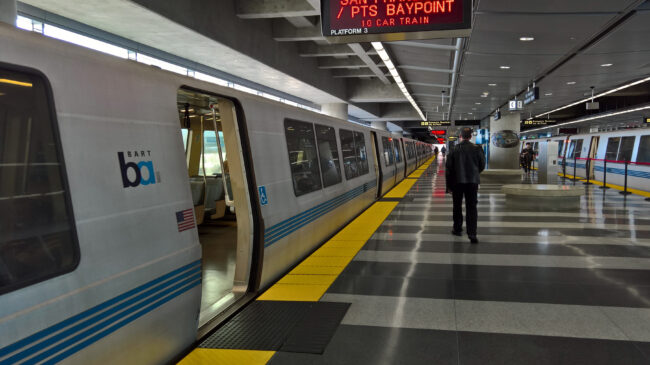The Department of Labor (DOL) has placed an unexpected speed bump in the path of California’s public transit agencies, such as Los Angeles Metro and San Francisco Bay Area Rapid Transit (BART), that were expecting to receive federal funding under the bipartisan infrastructure bill. Last month, the Office of Labor-Management Standards determined that a 2013 California state pension reform law, the Public Employees Pension Reform Act (PEPRA), violates a funding condition established under the Urban Mass Transportation Act (UMTA) of 1964.
However, California’s political leadership is not on board with this decision. Gov. Gavin Newsom sent a letter to Labor Secretary Marty Walsh opposing the Labor Department’s determination. Sens. Diane Feinstein (D-CA) and Alex Padilla (D-CA) endorsed the governor’s letter. News reports indicate that California’s mass transit agencies stand to lose a total of $12 billion in federal funding due to the Labor Department’s decision, including $9.5 billion from the recently signed infrastructure bill.
Section 13c of UMTA, which is codified in federal law as 49 U.S. Code § 5333, requires mass transit systems to abide by the following to receive federal aid:
- (A) the preservation of rights, privileges, and benefits (including continuation of pension rights and benefits) under existing collective bargaining agreements or otherwise;
- (B) the continuation of collective bargaining rights;
- (C) the protection of individual employees against a worsening of their positions related to employment;
- (D) assurances of employment to employees of acquired public transportation systems;
- (E) assurances of priority of reemployment of employees whose employment is ended or who are laid off; and
- (F) paid training or retraining programs.
Congress included these conditions as a response to circumstances very different from those we have today. In the post-World War II period, privately owned mass transit systems were struggling amidst steep ridership declines as riders switched to personal automobiles. State and local governments often responded by taking over these transit systems, many of which were unionized. Since some states prohibited public employee unions at the time, the concern was that transit employees would lose representation when local governments began operating the systems. The Section 13c provisions were intended to address this concern.
As the Government Accountability Office noted in a 1982 report: “The intent of the legislation was to maintain the status quo concerning rights, benefits, and privileges which labor had acquired in the transit industry under private ownership.”
All large California public transit agencies have been under public ownership for decades and are heavily unionized, so the legislative intent of UMTA does not appear applicable. But the Biden administration has clearly decided to interpret the law favorably for public employee unions.
The main thrust of California’s pension reform bill, PEPRA, was to limit pension benefits for newly hired public employees in order to increase the likelihood that the public pension systems were still solvent when newer employees begin collecting benefits. Some union members view this as a limitation on bargaining rights since mass transit agencies that participate in CalPERS are prohibited from providing a different level of pension benefits to post-2013 hires. But PERPA does not thwart the “continuation of pension rights and benefits” as specified in UMTA, since existing employees are not impacted by the new legislated benefit formulas.
PEPRA also includes some provisions affecting employees who were on government payrolls before the law was enacted. Specifically, it removed employees’ opportunities to purchase service credits. These additional service credits, known colloquially as “air time,” could qualify the employee for higher pension benefits in retirement. For example, consider the case of a public safety employee retiring after 26 years of service and who is on California’s classic 3% at age 50 benefit formula. If they did not purchase airtime, they would receive a yearly pension equal to 78% (26 years of service times a 3% multiplier) of their final average salary. By purchasing four years of air time, the employee could bump up their pension to 90% of their final average salary. PEPRA also tightened the definition of final average salary to exclude one-time and in-kind payments to a retiring employee. By imposing its own restrictions on air time and pension spiking (irrespective of whether these limits may seem like common sense reforms), the state legislature could be seen as intruding upon collective bargaining rights and worsening the position of current employees.
The Department of Labor’s Oct. 28, 2021, determination is not the first time it has identified PEPRA as conflicting with UMTA. Under the Obama administration, the Labor Department made a similar determination shortly after PEPRA was enacted. The California state government fought that determination in court and ultimately prevailed in 2018. The following year, the Department of Labor under then-President Donald Trump dropped its opposition to PEPRA. However, the Biden administration, which is very supportive of organized labor, appears ready to pick a new fight with California’s elected leaders using billions of dollars in federal transit funding the state was expecting.
Stay in Touch with Our Pension Experts
Reason Foundation’s Pension Integrity Project has helped policymakers in states like Arizona, Colorado, Michigan, and Montana implement substantive pension reforms. Our monthly newsletter highlights the latest actuarial analysis and policy insights from our team.

